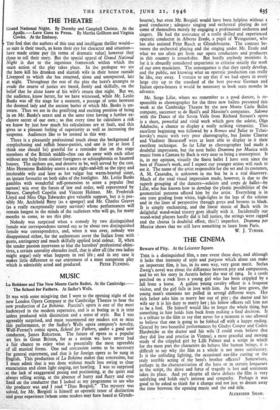MUSIC
La Boheme and The New Monte Carlo Ballet. At the Cambridge.— The School for Fathers. At Sadler's Wells.
IT was with some misgiving that I went to the opening night of the new London Opera Company at the Cambridge Theatre to hear the new production of La Boheme. Puccini's opera is one of the most hackneyed in the modern repertoire, and is as boring as it is trite unless produced with distinction and a sense of style. But I was agreeably surprised, and must recommend my readers not to miss this performance, or the Sadler's Wells opera company's novelty, Wolf-Ferrari's comic opera, School for Fathers, under a good new conductor, James Robertson. The future of opera as a popular art lies in Great Britain, for as a nation we have never had a fair chance to enjoy what is potentially the most agreeable of all musical forms. One sad concession seems to be necessary for general enjoyment, and that is for foreign opera to be sung in English. This production of La Boheme makes that concession, but I must admit that it was done without much loss owing to clear enunciation and clean light singing, not bawling. I was so surprised -at the lack of exaggerated posing and positioning, at the quiet and always telling acting, at the absence of hurry and flurry and eyes fixed on the conductor that I looked at my programme to see who the producer was and I read " Dino Borgioli." The mystery was solved, for Mr. Borgioli is himself an operatic tenor of distinction and great experience (Whom some readers may have heard at Glynde-
bourne), but even Mr. Borgioli would have been helpless without a good conductor ; adequate singing and orchestral playing do not come of themselves merely by engaging a professional orchestra and singers. He had the assistance of a really skilled and experienced operatic conductor in Alberto Erede, a pupil of Weingartner, who has also assisted Fritz Busch at Glyndebourne. The contrast be- tween the orchestral playing and the singing under Mr. Erede and what we too often get from our opera conductors and producers in this country is remarkable. But hardly anybody mentions it, for it is absurdly considered unpatriotic to criticise strictly the work of our own musicians. The consequence is that they rarely develop, and the public, not knowing what an operatic production can really be like, stay away. I venture to say that if we had opera in every large city up to the standard of the best pre-war German and Italian opera-houses it would be necessary to book seats months in advance.
Mr. Serge Lifar, whom we remember as a good dancer, is re- sponsible as choreographer for the three new ballets presented this week at the Cambridge Theatre by the new Monte Carlo Ballet company, successor to de Basil's and Massine's companies. Salome with the Dance of the Seven Veils from Richard Strauss's opera is a short, powerful and vivid work which gave the soloist, Olga Adabache, a chance to display a really striking virtuosity. This excellent beginning was followed by a Romeo and Juliet to Tchai- kovsky's music with very poor choreography, but Janine Charrat and Vladimir Skouratoff were at least able to display in it their excellent technique. So far Lifar as choreographer had made a doubtful impression, but the next ballet Dramma per Musica with music from a Cantata by Bach is very near to being a masterpiece. It is, in my opinion, visually the finest ballet I have seen since the best of Picasso's work, and I expect our younger artists will rush to see it. The name of the artist responsible for the set and its costumes, A. M. Casandra, is unknown to me but he is a real discovery. Much of the total visual impression made, however, is due to the superb grouping of the dancers—soloists and corps de ballet—by Lifar, who has known how to develop the plastic possibilities of the geometrical patterns offered him by the artist. Everything is in one tone grading from white, high-lights in the legs of the soloists and in the lines of perspective through greys and browns to black. It is simply enchanting, and the linear music of Bach with its delightful wood-wind tracery goes ideally with it. Incidentally our wood-wind players hardly did it full justice, the strings were ragged and the chorus (a doubtful effect, this!) imperfect. Dramma per Musica shows that we still have something to learn from Paris.
W. J. TURNER.


























 Previous page
Previous page